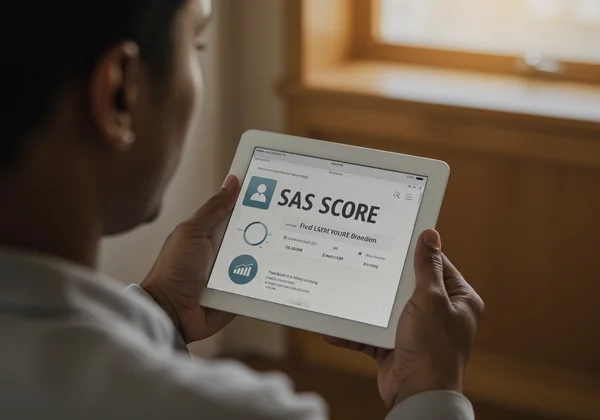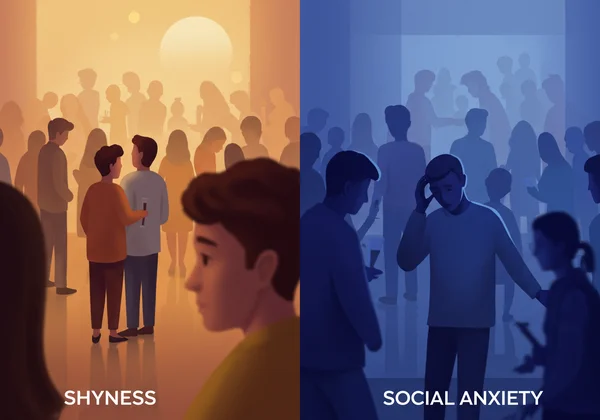Your LSAS Score: Next Steps for Social Comfort
August 4, 2025 | By Elara Donovan
Taking a step to understand your social comfort is a powerful act of self-awareness. You’ve likely just completed the Liebowitz Social Anxiety Scale (LSAS) and now have your LSAS Score in hand. This number is more than just a digit; it’s a starting point, a piece of a larger puzzle that can help you navigate your social world with greater confidence. Many people wonder, "Do I have social anxiety or am I just shy?", and this score is the first clue on your path to an answer.
This guide is designed to help you understand what your score means and, more importantly, what comes next. Knowledge is empowering, and the goal here is to provide you with clear, actionable strategies. Whether you're just exploring your feelings or actively seeking ways to manage them, these next steps can illuminate your path. If you haven't taken the assessment yet, you can get your score with our free LSAS test.
Understanding Your LSAS Score: What It Reveals
Your LSAS score is calculated based on your responses to 24 different social situations, measuring both the fear you feel and the extent to which you avoid them. It’s a snapshot of your current social comfort level, developed by psychiatrist Dr. Michael Liebowitz. The score provides a structured way to look at feelings that can often seem overwhelming and chaotic. Let's break down what this LSAS score meaning truly entails.

Deciphering Your LSAS Score Levels
The total score on this scale ranges from 0 to 144. It is generally categorized into different levels to help contextualize the results. This LSAS interpretation is a guide, not a label.
- 0-29: Minimal to No Social Anxiety: Scores in this range suggest you likely feel comfortable in most social situations and experience little to no disruptive social fear.
- 30-49: Mild Social Anxiety: You might feel noticeable anxiety in some social or performance situations but can usually face them. It may not significantly interfere with your daily life.
- 50-64: Moderate Social Anxiety: Social situations likely cause you distinct anxiety and are often avoided when possible. This level of discomfort may be impacting your routine, work, or relationships.
- 65-94: Marked Social Anxiety: You probably experience significant fear and avoidance of many social situations. This level often causes considerable distress and functional impairment.
- 95+: Severe Social Anxiety: Scores this high indicate intense, pervasive fear and avoidance related to social interactions, likely causing severe distress and disruption to your life.
Remember, this is a spectrum. Your score is a tool for understanding, not a final judgment.
Normal Shyness vs. Social Anxiety: Where Do You Stand?
This is one of the most common questions people have. While shyness and social anxiety can feel similar, they are fundamentally different. Shyness is a personality trait; you might feel uneasy around new people but can warm up over time. It doesn't typically stop you from pursuing your goals.
Social anxiety, or social phobia, is more intense. It involves a persistent, powerful fear of being judged or scrutinized by others. This fear can lead to physical symptoms like a racing heart, sweating, or trembling, and it often results in actively avoiding situations that trigger it. A social anxiety self-assessment helps quantify this distinction by measuring the impact on your life.

Your LSAS Next Steps: Actionable Strategies
Receiving your score is the beginning of a journey, not the end. The next steps are about using this newfound insight to create positive change. Whether your score is low or high, you can always work towards greater social comfort and well-being.
Initial Self-Help Tips for Social Anxiety
If you're looking for immediate, practical ways to start managing feelings of social anxiety, here are a few simple strategies you can try today:
-
Practice Mindful Breathing: When you feel anxiety rising, focus on your breath. Inhale slowly for four counts, hold for four, and exhale for six. This simple act can calm your nervous system and bring you back to the present moment.
-
Challenge Negative Thoughts: Social anxiety often thrives on "what if" scenarios. When you catch yourself thinking "Everyone will think I'm awkward," gently challenge it. Ask yourself: "Is that 100% true? What's a more balanced perspective?"
-
Take Small, Gradual Steps: You don't have to conquer your biggest fear tomorrow. Start small. If making eye contact is hard, try it with a cashier for a second longer than usual. Celebrate these small wins to build momentum. This gradual exposure can make a big difference.

When to Consider Professional Support
Self-help strategies are valuable, but sometimes, professional guidance is the most effective path forward. Your LSAS score can be an excellent resource to bring to a therapist or counselor. Consider seeking professional support if:
- Your social anxiety is significantly impacting your work, school, or relationships.
- You are avoiding important opportunities or activities because of fear.
- You experience intense physical or emotional distress in social settings.
- Self-help efforts haven't provided enough relief.
A mental health professional can offer evidence-based treatments like Cognitive Behavioral Therapy (CBT), which is highly effective for social anxiety. Starting that conversation is a sign of strength, and a Liebowitz Social Anxiety Scale online result can make it easier to begin.
AI-Powered Insights for Your LSAS Score
Your LSAS score provides a valuable numerical overview, but your unique experiences and individual journey are what truly matter. Beyond the standard scoring, we offer an optional, AI-powered personalized analysis that goes beyond the numbers to give you truly actionable insights.
Unlocking Deeper Understanding of Your Triggers
The AI-driven report analyzes your specific answers to the LSAS questionnaire to identify your personal triggers. Does your fear spike when talking to authority figures, or is it more pronounced in unstructured social gatherings? The report pinpoints these patterns, helping you understand exactly what situations are most challenging for you. This clarity turns a vague sense of "anxiety" into a well-defined challenge you can begin to address. You can discover your results and see these patterns for yourself.
Personalized Paths Towards Social Well-being
Once your triggers are identified, the AI report doesn't stop there. It provides personalized suggestions and insights tailored to your unique profile. Instead of generic advice, you get recommendations that directly address your specific areas of fear and avoidance. It might highlight your strengths—perhaps you have low avoidance despite high fear, indicating great courage—and suggest ways to build on them. This personalized roadmap can be a powerful next step after completing your lsas online test.

Empowering Your Path to Greater Social Comfort
Your LSAS score is a key that has unlocked a door to greater self-understanding. You now have a clearer picture of your social comfort level and a set of actionable next steps. Remember that this journey is a marathon, not a sprint. Be patient and compassionate with yourself as you explore these new insights and strategies.
Whether you choose to start with small self-help steps, seek professional support, or delve deeper with a personalized AI report, you are actively taking control of your well-being. This is an empowering position to be in. We encourage you to use the resources available at LSAS.me as a trusted companion on your path to greater social comfort.
Frequently Asked Questions About Your LSAS Score & Next Steps
How to interpret LSAS scores?
LSAS scores are interpreted on a scale from 0 to 144, divided into ranges indicating minimal, mild, moderate, marked, or severe social anxiety. The score reflects the combined level of fear and avoidance across 24 social situations. A higher score suggests a greater impact of social anxiety on your life.
What are the grades of social anxiety?
The generally accepted grades, based on the LSAS score, are: Mild (30-49), Moderate (50-64), Marked (65-94), and Severe (95+). These grades help provide context but are not formal diagnoses. They are reference points to understand the level of distress and impairment.
What is considered severe social anxiety?
A score of 95 or higher on the LSAS is typically considered indicative of severe social anxiety. This level suggests intense and pervasive fear and avoidance of social situations, which often causes significant disruption to a person's daily functioning, relationships, and overall quality of life. Professional help is strongly recommended at this level.
Do I have social anxiety or am I just shy?
Shyness is a personality trait involving discomfort in new situations, which usually fades over time. Social anxiety is a more intense condition characterized by a persistent fear of being judged, leading to significant distress and avoidance that can impair your life. Taking a social phobia test like the one on our site can help clarify where you stand.
Disclaimer: The Liebowitz Social Anxiety Scale (LSAS) is a screening tool, not a diagnostic instrument. The results provided by LSAS.me are for informational purposes only and should not replace a professional evaluation by a qualified healthcare provider. If you are concerned about your mental health, please consult with a doctor or mental health professional.